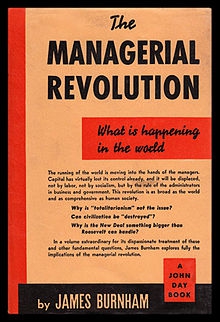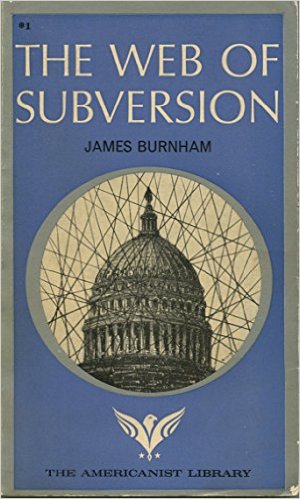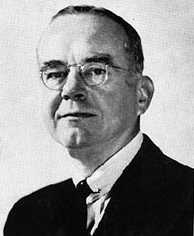James Burnham was an American political theorist who was a somewhat influential figure within the circles of American post-war conservatism. Like some others who joined the conservative movement during that time, Burnham was an ex-Trotskyite who had lost his faith in Communism and come over to the conservative side of politics. Among others, Burnham influenced the late Sam Francis, who was a journalist within the conservative movement, but who was later purged because of his heretical views on race and other topics. It was through some of Francis’ excellent articles published at Radix that I was introduced to Burnham to begin with.
One of the most important and engaging topics for the Alt-Right is the relation between culture and politics: so-called metapolitics. In this context, the Marxist theorist Antonio Gramsci is often put forward as an important thinker because of his thoughts about hegemony, the prerequisites for political change, and the necessity for intellectuals. My personal view, which I have argued for elsewhere, is that Gramsci is best understood as a form of constructivist, meaning someone who believes that reality is not a given but that it can be shaped and changed by ideas. As I read Gramsci, the Marxist trajectory is not as much revealed as it is created by convincing people of its truth. Borrowing a term from Simon Hix, Gramsci could be called a ‘strategic constructivist’, meaning someone who uses ideas strategically to reach a political goal.
There are, however, several weaknesses in Gramsci as a thinker. His first fault is, of course, that he was a Marxist, and was attempting to save a failing theory. Furthermore, he wrote down his thoughts under anything but ideal circumstances, having been jailed by the Italian state. As a result of this, his writing is often unsystematic, and the good points have to be singled out from a vast number of lesser points. I think that Gramsci touched on important topics, but much of his claim to fame was established by others after his death. Roger Scruton writes in his Thinkers of the New Left that the Left wanted a hero, after all the others had been defamed, and that they found a heroic figure in Gramsci as the martyr of their cause.
Gramsci touched upon important topics, and he was, to a degree, an original thinker. But there is much lacking in his analysis, and this is unfortunate. Gramsci’s analysis needs to be complemented by a more thorough one. Toward this end, I would like to discuss some of the ideas which were advocated by Burnham. It is my opinion that Burnham touched upon topics which, as with Gramsci, deal with the prospect of political change and how to bring a new political elite to power. The difference, as I see it, is that Burnham does a better job than Gramsci.
 His books of greatst interest are The Machiavellians and The Managerial Revolution. The first one is mainly about the political theories of a number of thinkers who Burnham considered to be a part of what he called the Machiavellian tradition. The main argument of the book is that politics, defined as a struggle for power, can never be removed from human existence. In every society, there must be one group of people who rule, and one group who is the subject of that rule. In the second book, Burnham makes the case that a revolution is well under way, but not the type of revolution which is often advocated by the Left. The managerial revolution is taking place within the bureaucracy of the modern state, and is the revolution of the managers, at the expense of other forms of leadership.
His books of greatst interest are The Machiavellians and The Managerial Revolution. The first one is mainly about the political theories of a number of thinkers who Burnham considered to be a part of what he called the Machiavellian tradition. The main argument of the book is that politics, defined as a struggle for power, can never be removed from human existence. In every society, there must be one group of people who rule, and one group who is the subject of that rule. In the second book, Burnham makes the case that a revolution is well under way, but not the type of revolution which is often advocated by the Left. The managerial revolution is taking place within the bureaucracy of the modern state, and is the revolution of the managers, at the expense of other forms of leadership.
In the first chapter of The Machiavellians, Burnham discusses the poet Dante Alighieri as an example of someone who promoted ideas which in practice had a different purpose than that which was stated by their author. The point of the chapter is to introduce a type of thinking which Burnham calls ‘anti-formalism’, and which is divided into two different meanings: the formal and the real. The formal meaning is the intention as it is explicitly stated by the author, and the real meaning is what this intention actually implies. Using Dante as an example, Burnham points to the fact that Dante advocated a number of normative principles which he believed should be defining characteristics of a good government. Dante also advanced the idea that the Emperor of the Holy Roman Empire should be sovereign in relation to the Pope.
Burnham further explores the meaning of anti-formalist thinking in the second chapter of The Machiavellians, which is about Machiavelli himself. In this chapter, Burnham elaborates on the Machiavellian tradition and its prospects for a political science. Burnham’s position is that politics should be studied in a scientific way, freed from various normative concepts, ethical systems, and the demands that they can make on a science. The Machiavellian way of thinking should not, says Burnham, be condemned because of its lack of adherence to some ethical system. It should only be judged in terms of how well its conclusions match the facts, as with all forms of science. Moreover, a political science should not pretend that politics is anything other than what it is: a struggle for power.
 When it comes to Dante, Burnham goes on to place his seemingly independent normative principles in their proper context. He shows that Dante had been involved in an extensive and lengthy conflict between the Ghibelline and the Guelph factions. Dante and the faction to which he belonged lost to their rivals, and he went to the Holy Roman Emperor to ask for his support. When these facts were presented, it became quite clear that Dante had put forward his principles with the hope of winning the good graces of the Emperor, and thus attempted to justify his rule. That is the true meaning of De Monarchia, as Burnham sees it.
When it comes to Dante, Burnham goes on to place his seemingly independent normative principles in their proper context. He shows that Dante had been involved in an extensive and lengthy conflict between the Ghibelline and the Guelph factions. Dante and the faction to which he belonged lost to their rivals, and he went to the Holy Roman Emperor to ask for his support. When these facts were presented, it became quite clear that Dante had put forward his principles with the hope of winning the good graces of the Emperor, and thus attempted to justify his rule. That is the true meaning of De Monarchia, as Burnham sees it.
Using Dante as an example can seem rather difficult to relate to, since he is virtually unknown as a political theorist, and is more or less exclusively regarded as a great poet. I think it’s more useful to apply the same analysis to schools of thought more relevant to our day instead. For illustrative purposes, we can say something about feminism. When feminism becomes involved in politics, it is often or always the case that its proponents advocate their suggested policies from the standpoint of normative principles; chiefly, equality between the sexes. From this standpoint, they often point out problems such as the idea that there are more men than women on executive boards, that male cultural symbols dominate the public sphere, that women in general have a more difficult time on the labour market because of motherhood, male discrimination, and so on. Or, in the case of Sweden, they claim that mothers in general make greater use of paid parental leave than do their husbands.
The suggested solution to perceived problems such as these are often to advocate various measures to be taken by the government. Agencies within the government should be allowed to dictate corporate policy and tell them who to hire and who not. Measures should be taken to do away with male symbols from public spaces. Parents should be forced to share parental leave equally, regardless of the wishes and needs of the individual family. Some feminist theorists, such as Nancy Fraser, propose openly that the government should assume control over corporate life in order to make sure that they hire equally, and that extensive and costly social strategies aimed at women can be paid for through taxation. The assumption made by people such as Fraser and her colleagues is that increased state powers are necessary in order to come to terms with inequality.
We could take Fraser and other feminists at face value and debate whether equality and their other proposed political measures are good or bad. But if we are to apply anti-formalism, we would instead draw the conclusion that these values are less important than the measures of power that they justify. And these particular principles justify encroachment by the state – and more specifically, certain groups within the state – at the expense of the business community and civil society. This is not really about which policies are good or bad, but about which groups are to decide on these things at the expense of other groups. As Burnham eloquently puts it:
We think we are debating universal peace, salvation, a unified world government, and the relation between state and church, when what really is at issue is whether the Florentine Republic is to be run by its own citizens or submitted to the exploitation of a reactionary foreign monarch. We think, with the delegates at the council at Nicea, that the discussion is concerned with the definition of God’s essence, when the real problem is whether the Mediterranean is to be politically centralized under Rome, or divided. We believe we are disputing the merits of a balanced budget and a sound currency when the real conflict is deciding what group shall regulate the distribution of the currency. We imagine we are arguing over the moral and legal status of the principle of the freedom of the seas when the real question is who is to control the seas. (Burnham, The Machiavellians, p. 16)
It shouldn’t be a surprise that Burnham had a cynical view of the role of some intellectuals and scientists. He held the view that those who contend for power will always find someone who is willing to be their spokesman and justify their rule through a philosophical or scientific system. Burnham elaborated his view on ideology further in The Managerial Revolution. The important thing here is that ideologies should be viewed as an expression of group interests. If an ideology happens to be dominant in a society, then it is connected to the group currently in power. This is the important thing for our purpose; not whether an ideology is true or false, good or bad, but rather that it expresses the will to power of a particular group.
Ideologies are often frowned upon as unscientific, or even mythic in essence. Burnham would agree completely with this view. But that doesn’t mean that ideologies are not important and useful. Ideologies can convert people to a cause that they would not otherwise support. Ideologies can make people forget their own interests and instead pursue the interests of another group. If a group cannot produce a coherent ideology, can it be said to have any will to power? My answer is no. The Left has done a very good job during the course of the twentieth century in producing powerful and attractive ideological systems: Marxism, socialism, feminism, post-colonialism, and psychoanalysis. We also have ideologies emerging from what can be seen as a form of Right: neo-liberalism, Americanism, and individualism. Moreover, we have endless combinations of these ideologies.
 It is important not to overlook the importance of the managerial state, and the importance of the state in general. It is not enough to merely philosophise; there needs to be a political elite and a physical structure which underpins this elite. We can take Sweden as an example. Sweden took a turn toward the Left during the 1960s and never really recuperated. This was not achieved solely through the work of intellectuals and Leftist philosophical theories. What happened in addition to this was that a large number of people were recruited to work as functionaries and civil servants in the ever-growing state machinery. Social workers, teachers, and administrators were recruited and formed a bureaucracy the like of which Sweden had never experienced before. They became the new class of managers. Regardless of what kind of government gets elected, this establishment stays more or less the same.
It is important not to overlook the importance of the managerial state, and the importance of the state in general. It is not enough to merely philosophise; there needs to be a political elite and a physical structure which underpins this elite. We can take Sweden as an example. Sweden took a turn toward the Left during the 1960s and never really recuperated. This was not achieved solely through the work of intellectuals and Leftist philosophical theories. What happened in addition to this was that a large number of people were recruited to work as functionaries and civil servants in the ever-growing state machinery. Social workers, teachers, and administrators were recruited and formed a bureaucracy the like of which Sweden had never experienced before. They became the new class of managers. Regardless of what kind of government gets elected, this establishment stays more or less the same.
Burnham deals with the question of the elites in Chapter Three, in which he discusses the theorist Gaetano Mosca. In this chapter, he stresses the importance of the ruling class:
From the point of view of the theory of the ruling class, a society is the society of its ruling class. A nation’s strength or weakness, its culture, its prosperity, its decadence, depend in the first instance upon the nature of its ruling class. (Ibid., p.67)
The ruling class is the group of people who can be successful in the struggle for power, namely politics. Typically, it is made up of people who can break through in the struggle and face its challenges. These people are usually not the wise and self-reflecting types. More successful traits include ambition, ruthlessness, and the capacity for hard work. Everyone who has ever been involved in politics knows that hens and peacocks seldom, or never, live long in a world dominated by wolves, vultures, and centipedes – in a word, predators. But taken at face value, no elite is so raw and unrefined. Usually, as Burnham emphasises, it expresses itself through some form of political formula or myth. As I stated above, the meaning of ideology is to express and direct the will to power of a particular group.
I draw the following conclusions from this discussion:
I: To begin with, it is not enough to view intellectuals as the makers of political change through their transmutation of culture. It is also necessary to consider the state and the elite who will rule it. Politics becomes impossible to conduct without the type of hardworking, ruthless, and ambitious people who generally make up the political class. Oswald Spengler described Caesarism as no one else could, but he could never have been a Caesar himself. Gramsci assigned the so-called ‘organic intellectuals’ an important role as the makers of political change, but they are not enough in themselves.
II: Nevertheless, the intellectuals are important. A group which contends for power needs a political myth or ideology to express its will to power and to justify their struggle and coming ascension to the position of the ruling class. It would seem that a group lacking such a formula will achieve no success in its endeavors. The political agents need to work together with the intellectuals: one group to formulate the ideas, and one group to express them. The present political elite justifies their actions through the framework of Cultural Marxism; it would have been impossible for them to act without this framework.
III: From a scientific point of view, Burnham is superior to Gramsci because he tells the truth about all politics, and not just about the politics of his adversaries. If we are to take Gramsci at face value, his theory describes how the Marxists are hindered in their struggle to express the true interests of the working class because they are under the spell of the bourgeois hegemony. The real meaning of Gramsci’s theory was, however, not to describe facts about political life but rather to create a myth strong enough to motivate the working class into changing their preferences, and throw in with the Left as it was. These Machiavellian insights can be applied to all political ideas – and not just from the perspective of one particular position.
To conclude, I think that the success of the Alt-Right will come when ambitious and somewhat ruthless people pick up its ideas and use them to serve their ambition. Such a person is Donald Trump, who represents the ideas of nationalism and populism. But this could never have happened without intellectuals who ‘memed into existence’, to use a clever and true phrase. Trump would still only be a successful businessman and TV celebrity without the nationalist ideas which he advocates, and which in turn justifies his struggle for power. The success of the ideas of the Alt-Right will mean the success of a new elite, and the success of this elite will mean the success of the Alt-Right.



 It is not enough to view intellectuals as the makers of political change through their transmutation of culture. It is also necessary to consider the state and the elite who will rule it. Politics becomes impossible to conduct without the type of hardworking, ruthless, and ambitious people who generally make up the political class.
It is not enough to view intellectuals as the makers of political change through their transmutation of culture. It is also necessary to consider the state and the elite who will rule it. Politics becomes impossible to conduct without the type of hardworking, ruthless, and ambitious people who generally make up the political class.
 del.icio.us
del.icio.us
 Digg
Digg
Les commentaires sont fermés.